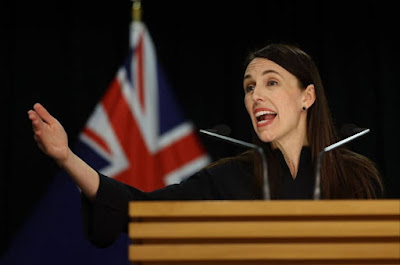AS THIS TERRIBLE YEAR, this annus horribilis, draws to a close, we must all hope that 2023 brings us happier days.
As we watch the Chinese Government transition from its old, hardline, Covid-19 elimination strategy, characterised by long and uncompromising lockdowns, to a new, laissez-faire, wide open borders (and bugger the health system) strategy, uncannily like our own, we have confirmation that not even the totalitarian regime of Xi Jinping’s Communist Party can operate indefinitely without a social licence.
Not that our own government is returning the compliment by acknowledging the lack of genuine social licences for its own flagship policies – and changing them. There is more than a whiff of totalitarian indifference to public opinion in the Labour Caucus’s blunt refusal to change course on Nanaia Mahuta’s Three Waters project.
When the results of the local government elections made it painfully clear that whatever limited social licence central government might have claimed for Three Waters had been withdrawn, the Labour Government refused to flinch. The former National Party Cabinet Minister Nick Smith, now Nelson’s Mayor, implored the Prime Minister, Jacinda Ardern, to back away from the project. Failure to do so, he suggested, would indicate that her government had a “death wish”.
Undeterred, Labour doubled-down. Constitutional conventions became confetti. The co-governance provisions of Three Waters became stronger and their likely impact on Māori-Pakeha relations even more divisive.
And this situation looks set to be made ten-times worse the moment the public cottons-on to the fact that the cost of borrowing the billions required to “fix” their drinking-, storm- and waste-water systems is to be extracted from the pockets of the poor schmucks who “own” – but do not control – the four vast “entities” at the heart of the Three Waters project. A bitter realisation, that will hit home about the time they open their new-fangled water bills.
The Labour Government’s intransigence on Three Waters was not, however, matched by its response to the ever-increasing clamour for decisive state action on global warming. Far from becoming this government of Gen-Xers’ “nuclear-free moment”, the Labour-Green tag-team on Climate Change has impressed New Zealanders only by its prodigious ability to dilly, dally and delay. If the New Zealand football team possessed this government’s talent for kicking the can down the road, they could have won the World Cup!
Maybe, if Labour possessed an environmental faction as strong as its Māori faction more progress might have been made on Climate Change. But, if the Government refuses to be guided by public opinion on the deeply unpopular policy of co-governance, it is acutely sensitive to the social and economic realities that continue to keep SUVs at the top of the list of motor-vehicles purchased in New Zealand. When pushbikes replace four-by-fours in Kiwi affections, it is then – and only then – that our carbon emissions will plummet.
Covid, Co-Governance and Climate-Change may have helped to shape the domestic politics of New Zealand in 2022, but they have done so in the shadow of something much larger and more terrible than anything we Kiwis could conjure-up.
War.
Russia’s bloody invasion of Ukraine has dealt what looks like being the final death-blow to the “international rules-based order” overseen by the United Nations. What we deplored, then ignored, in Syria, has come home to the cursèd bloodlands of Eastern Europe.
The global economic system, already rendered dangerously fragile by the financial measures required to fight the Covid-19 pandemic, has received a vicious kick in the gonads from Russia’s combat boots. Rising inflation has ignited multiple cost-of-living crises – even in the world’s wealthiest countries – precipitating social and political conflicts not seen for nearly half-a-century.
But Vladimir Putin’s aggression has done something else. It has stimulated martial feelings long thought dead and buried in the materially abundant (but spiritually impoverished) societies of the West.
The Russo-Ukraine War has not produced a global peace movement – even under Putin’s constant threats of nuclear escalation. On the contrary, it has generated a “war movement”. Prior to 24 February 2022, Volodymyr Zelensky would not have struck most people as the man to revive the Latin verse: Dulce et decorum est pro Patria mori – Sweet it is and fitting to die for one’s country.
When the heroism and sacrifice of war seem preferable, and more honourable, than an enervated peace, it is, truly, a terrible year.
This essay was originally published in The Otago Daily Times and The Greymouth Star of Friday, 30 December 2022.










